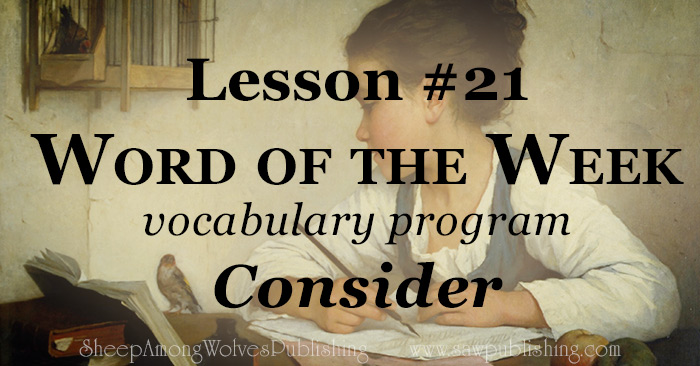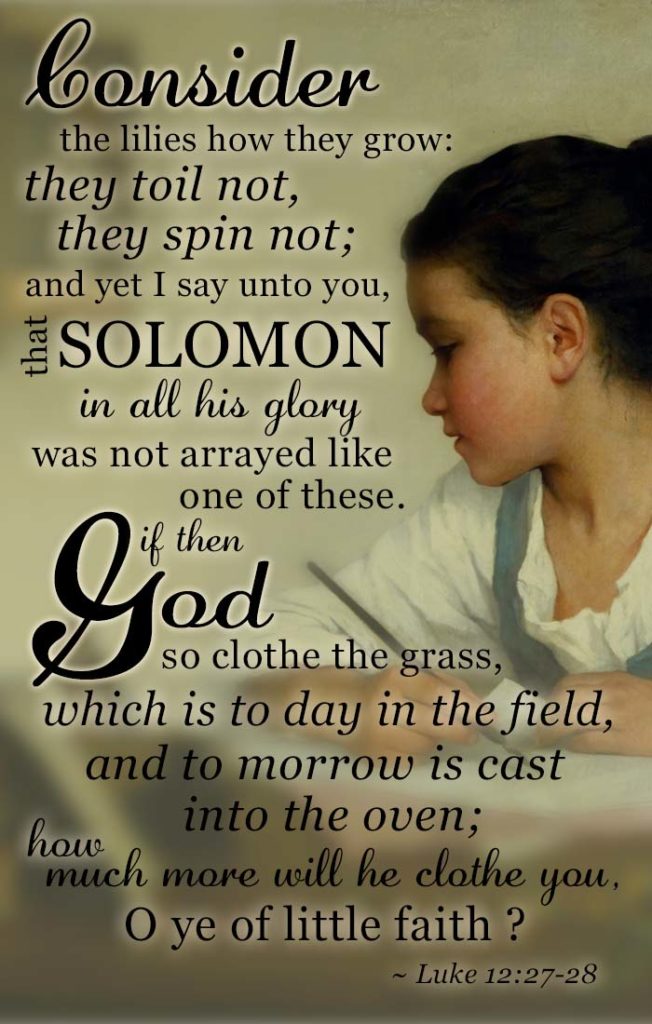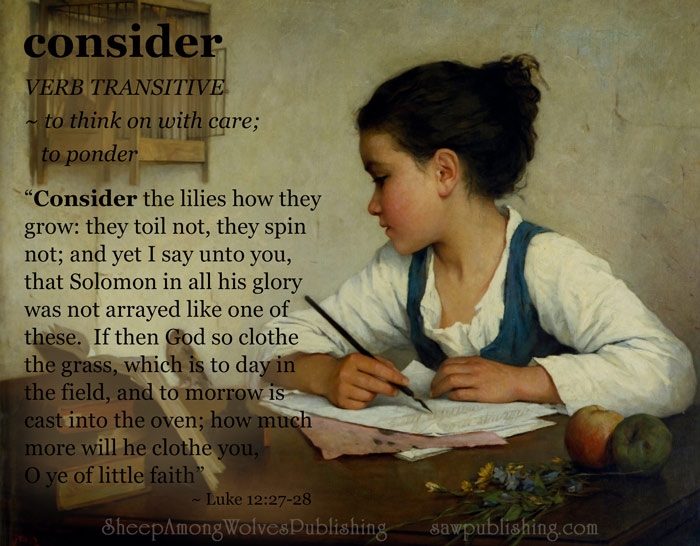Word of the Week Lesson #21 – CONSIDER
SAW Publishing’s Word of the Week (WOW) program is a vocabulary supplement built around hymns and Bible verses. Each lesson contains a Webster’s 1828 Dictionary definition, Scripture reference, and examples that encourage students to use new vocabulary in daily life. To find out more about the program, see our post entitled Boost Your Student’s Vocabulary with our FREE Word of the Week. To receive the FREE Word of the Week lesson the Monday before it is posted, sign up for the WOW email below.

Word of the Week Lesson #21
**Click here for a downloadable PDF of the full lesson.
consider
Short Definition
Abridged from Webster’s 1828 Dictionary
CONSID’ER, verb transitive
to think on with care; to ponder
Webster’s 1828 Full Definition
CONSID’ER, verb transitive
[L. considero, to consider, to view attentively, from consido or consideo, to sit by; con and sedeo, to sit. See Sit. The literal sense is, to sit by or close, or to set the mind or the eye to; hence, to view or examine with attention.]
 1. To fix the mind on, with a view to a careful examination; to think on with care; to ponder; to study; to meditate on.
1. To fix the mind on, with a view to a careful examination; to think on with care; to ponder; to study; to meditate on.
Know, therefore, this day, and consider it in thy heart. Deuteronomy 4:39
Hast thou considered my servant Job? Job 1:8
Consider the lilies of the field how they grow. Matthew 6:28
2. To view attentively; to observe and examine.
The priest shall consider the leprosy. Leviticus 13:13
3. To attend to; to relieve.
Blessed is he that considereth the poor. Psalm 41:1
4. To have regard to; to respect.
Let us consider one another, to provoke to love, and to good works. Hebrews 10:24
5. To take into view in examination, or into account in estimates.
In adjusting accounts, services, time, and expense ought to be considered.
6. In the imperative, consider is equivalent to, think with care, attend, examine the subject with a view to truth or the consequences of a measure. So we use see, observe, think, attend.
7. To requite; to reward; particularly for gratuitous services.
All definitions are taken from the Webster’s 1828 Dictionary from Archive.org Volume 1 and Volume 2 and can also be found on Webster’s 1828 Dictionary online
Memory Verse
“Consider the lilies how they grow: they toil not, they spin not; and yet I say unto you, that Solomon in all his glory was not arrayed like one of these. If then God so clothe the grass, which is to day in the field, and to morrow is cast into the oven; how much more will he clothe you, O ye of little faith?” ~ Luke 12:27-28 (KJV)
All scripture references are taken from the King James Bible
Hymn
My recommendation for today’s hymn is “How Great Thou Art,” one of the most famous Christian compositions of the 20th century. As it is still under copyright, we are not able to include the text here, but you can follow the link to Cyber Hymnal for the full words and tune.
I would advise using the first verse and chorus for your WOW lesson, although more may be included if desired.
How Great Thou Art, by Stuart K. Hine (1899-1989).
Examples from Daily Life
“I didn’t consider the possibility that Skye would colour on the table,” said Philip, with some consternation.
“Don’t worry,” Mrs. Gravesend assured him, as she gently freed Skye’s hand from the pencil. “Pencils are for paper, not for tables,” she told the toddler. “I’m going to take Skye upstairs to play in the big girls’ room,” she added to Philip and Robyn. “I think she’s a little too young to colour without supervision. When I come back, we can consider what to do about these pencil marks.”
“Let’s get our math lesson finished, while Mom is gone,” Robyn suggest. “That will be a nice surprise for her. After all, she is probably pretty disappointed about the table, considering we only got it last week.”
Printable Image with Short Definition and Memory Verse

Bonus Activity
For this week’s bonus activity, you will be creating an acrostic. Webster’s 1828 Dictionary defines an acrostic as: “A composition in verse, in which the first letters of the lines, taken in order, form the name of a person, kingdom, city, &c., which is the subject of the composition, or some title or motto.”
Today, an acrostic does not necessarily need to be poetry. Often, each “line” consists of just one word. Occasionally, it is the last, or even the middle letter, which forms the hidden message. But the foundational idea behind acrostics is still the same.
As an example, consider the following:
Carefully
Observe,
Note,
See,
Internalize,
Discern,
Examine, and
Reflect
Choose one of the past WOW words, and write an acrostic to help you remember its meaning.
Answer to Last Week’s Bonus Activity
WOW #19 was sufficient. 2 Corinthians 9:8 contained the word sufficiency.
How To Sign Up
Each week’s WOW lesson will be available on the Sheep Among Wolves blog on Friday morning.
If you would prefer to receive the lessons by email, you can sign up below to have each new lesson delivered on the Monday before it’s posted. This gives you time to print out the sheet, and have it ready for the next week, as well as making sure you don’t miss any posts. Email signup will include a high resolution copy of the image for those who wish to print it out in poster form. Concerned that you have missed the start of our program? Don’t worry, all emails contain links to previous lessons. No matter when you sign up, you will receive access to all lessons from the Word of the Week program.
This post may have been shared with the following linkups: The Art of Homemaking Mondays, What Joy is Mine, The Modest Mom, Homemaking Wednesdays, Wise Woman Linkup.
You might also like:

This charming story seems to be geared to children at first glance, but the truths explored are ones that we all need to ponder as we join Davie in seeking to be “faithful in the least” – Luke 16:10.
